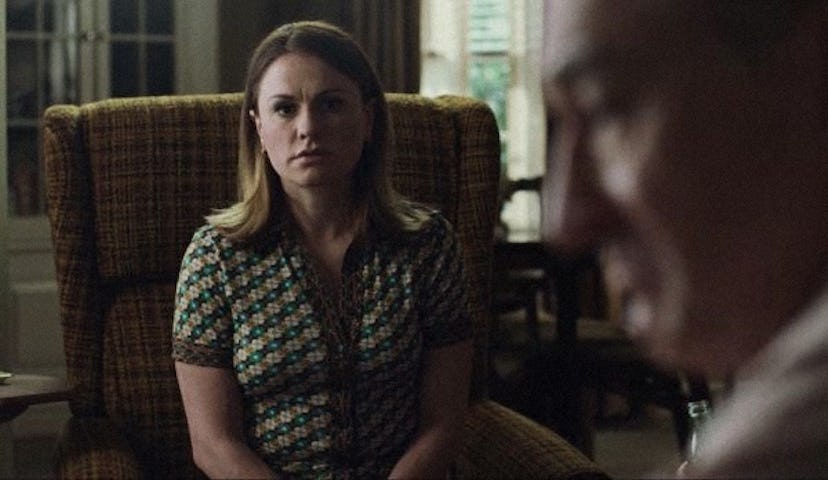Was Anna Paquin Deprived of Screen Time in The Irishman?

Over Thanksgiving weekend, in between bites of turkey, presumably thousands of Americans tuned in to Martin Scorsese‘s latest film, The Irishman, on Netflix.
Though we cannot be sure of the exact number of viewers, since the platform is notoriously close to the vest with their streaming data, what we can be certain of is the fact that this film has sparked some serious discourse among fans and haters alike. The Irishman was already testing Film Twitter’s patience with its 3.5-hour runtime, and then Scorsese released an op-ed with his thoughts on Marvel movies and what should count as cinema in this day and age.
But after people finally watched The Irishman on Netflix, what many took issue with was the lack of onscreen dialogue from women, particularly Anna Paquin’s character, Peggy Sheeran. Sheeran is arguably one of the most important female characters—if not the most important—in The Irishman, but it’s not entirely possible to discuss the full impact and purpose of this character without spoiling the movie a little bit, so beware.
The daughter of Frank Sheeran, a teamster and labor union official connected to the Bufalino crime family, Peggy is introduced as a child (played by Lucy Gallina). When her father comes home one day to discover a shop owner had shoved her in the store, he grabs Peggy, brings her down to the store, and beats the guy, curb-stomping his hand until it is a bloody pulp. Peggy watches in horror and doesn’t say much to her father for the rest of the film, as she now knows what Frank is capable of. This is later confirmed when, in the final days of his life, Frank speaks to Dolores, another daughter (played by Marin Ireland), who confesses that she and her sisters never felt they could come to him for help out of fear of what he might do to handle the situation.
When young Peggy meets Russell Bufalino (played by Joe Pesci), the crime boss who got her father into the family business in the first place, she senses something off about him. Her relationship to Russell is presented in stark contrast to the relationship she cultivates with Jimmy Hoffa (played Al Pacino). The two have a sweet, almost familial attachment to each other, bonding over their love of ice cream sundaes. It makes sense that when Jimmy Hoffa disappears, Peggy’s big moment comes in the form of confronting her father about why he has not yet called Jo Hoffa, Jimmy’s wife, at approximately two hours and 50 minutes into the film.
“Why?” she asks him. “What?” her dad replies. “Why?” she asks once more. “Why what?” Frank responds. “Why haven’t you called Jo?” Peggy says. After speaking those seven words, the character instantly recognizes that her father most likely had something to do with the disappearance of one of his closest confidantes. From that day forward, according to Robert De Niro’s voiceover narration as Frank Sheeran in the film, she cuts all ties to her father and never speaks to him again.
Though Paquin’s role is a supporting one, an Oscar-winning actress speaking just seven words in a 3.5-hour film naturally rubbed audiences the wrong way.
Others argued that Paquin’s limited number of lines points to the strength of her performance. Silence is golden and all of that.
Some rumors even circulated that Paquin had been “ordered” by Scorsese to be in The Irishman, though the actress swiftly shut them down on Twitter.
De Niro, a producer of the film in addition to its star, spoke about the decision to give Paquin so little to say. “She was very powerful and that’s what it was,” he told USA Today. “Maybe in other scenes there could’ve been some interaction between Frank and her possibly, but that’s how it was done. She’s terrific and it resonates.”
The Irishman is a many-layered film that asks a lot of its viewers—and not just focusing on one thing for over three hours. The film requires some prior knowledge of crime history; some familiarity with the genre upon which it is commenting and simultaneously is a part of; and some experience with Scorsese’s previous work, such as Taxi Driver and Goodfellas, to which The Irishman often alludes. You really do have to analyze it from a multitude of lenses to get the full picture.
It’s also true that acting is not solely about how many lines a performer delivers. Paquin’s facial reactions do speak volumes and her performance is no doubt powerful, but at the end of the day, a seven-word scene in which Peggy attempts to stand up against her father’s misdeeds is not nearly enough for a film that long.
Related: Martin Scorsese Wrote a Fire Op-Ed About Marvel: The Best Reactions